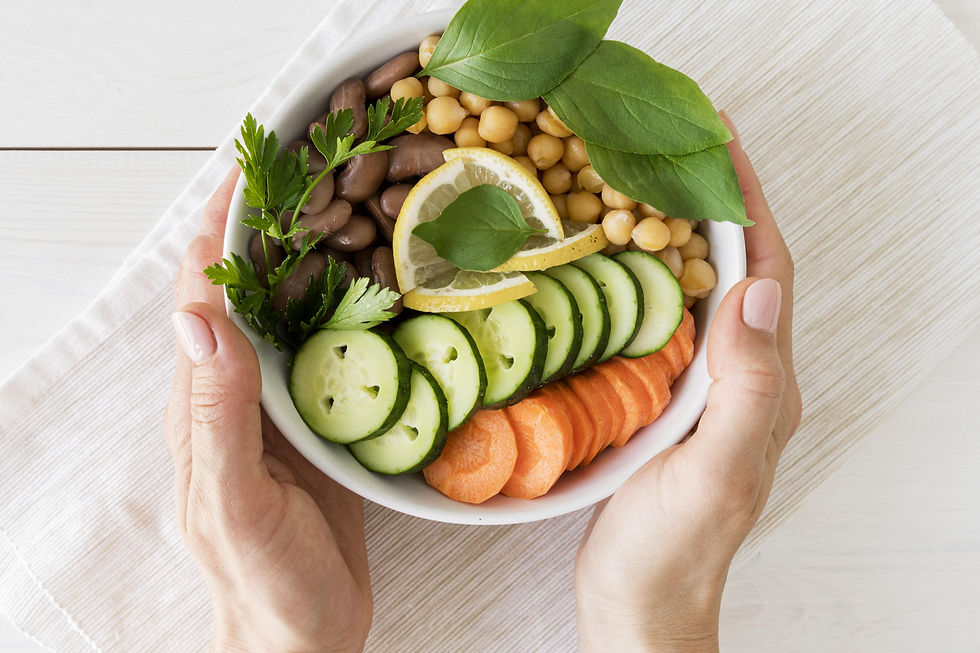How Your Diet Affects Sleep: A Guide to Better Rest
- Wellness Academy Team

- Aug 6, 2025
- 3 min read

We all know how essential sleep is to our health — but did you know that what you eat could be helping or harming your sleep quality?
From the timing of your meals to the nutrients on your plate, your diet has a direct influence on how well you sleep at night. Whether you struggle with falling asleep, staying asleep, or waking up refreshed, improving your eating habits could be the missing piece.
In this post, we explore the connection between nutrition and sleep and share practical tips to help you rest better — naturally.
Get healthy with Wellness Bowl now!
The Science Behind Sleep and Nutrition
Your sleep cycle is regulated by internal mechanisms such as melatonin and serotonin — two hormones influenced by your food intake. Additionally, your blood sugar levels, digestion, and gut health all play a role in determining how restful your sleep will be.
💡 Poor food choices can lead to disrupted sleep, vivid dreams, restless nights, and fatigue the next day — even if you clock in 7–8 hours.
What to Eat for Better Sleep
1. Foods Rich in Tryptophan
Tryptophan is an amino acid that helps the body produce serotonin and melatonin — key sleep hormones.
Include:
Eggs
Turkey
Oats
Bananas
Nuts and seeds (especially almonds and pumpkin seeds)
2. Complex Carbohydrates
Eating complex carbs promotes serotonin production and helps the brain relax.
Choose:
Brown rice
Sweet potatoes
Whole grain bread
Quinoa
Avoid refined carbs and sugary snacks, especially at night.
3. Magnesium-Rich Foods
Magnesium promotes muscle relaxation and reduces stress — helping you fall asleep faster.
Add:
Leafy greens (spinach, kale)
Avocados
Legumes
Dark chocolate (in moderation)
4. Chamomile and Herbal Teas
These natural remedies promote relaxation and ease digestion, especially after a late meal.
🍵 Bonus tip: Try warm chamomile tea 30 minutes before bedtime to ease into sleep.
Get healthy with Wellness Bowl now!
Foods and Habits That Disrupt Sleep
To optimize your rest, avoid these common pitfalls:
1. Caffeine After 2 PM
Coffee, tea, energy drinks, and even dark chocolate contain caffeine that can linger in your system for hours.
2. Heavy or Spicy Meals at Night
Rich, greasy, or spicy food can lead to indigestion and acid reflux, disrupting your sleep cycle.
3. Alcohol Before Bed
Although it might make you sleepy initially, alcohol actually disrupts REM sleep — the most restorative phase.
Meal Timing Matters Too
Don’t eat too close to bedtime. Ideally, have your last meal 2–3 hours before sleep.
Avoid skipping dinner. Hunger can keep you awake or cause blood sugar drops overnight.
The Sleep-Nutrition Link in Malaysian Lifestyles
Many Malaysians tend to eat heavy late dinners, consume kopi or teh tarik in the evening, or skip breakfast, which throws off both energy levels and sleep rhythms.
At Wellness Academy Malaysia, we work with individuals and companies to build personalized sleep-friendly meal plans, offer nutrition workshops, and promote holistic wellness strategies for better sleep and productivity.
Final Thoughts: Sleep Better by Eating Smarter
A good night’s rest starts in the kitchen. By making small adjustments to your diet — and paying attention to what, when, and how you eat — you can transform your sleep quality naturally without relying on pills or supplements.
Click here to try our corporate service.



Comments